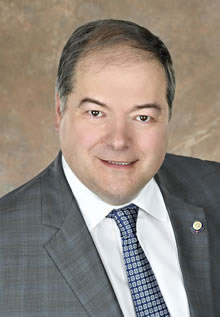Sharing expertise and best practices to improve nuclear safety and regulatory decision making

The fall of 2018 is a busy season for CNSC staff contributing technical and scientific expertise at various domestic and international meetings and conferences.
The nation's capital is the backdrop for a number of Canadian and international meetings of nuclear sector experts. From October 15-18, the CNSC and the CANDU Owners Group (COG) hosted the 7th International Workshop on CANDU Safety Association for Sustainability (CANSAS-2018). These meetings provide an ongoing forum for CNSC staff and their counterparts to share technical information and best regulatory practices and experiences associated with CANDU operations. At CANSAS-2018, agenda items included long term operation, reliability and aging management of CANDU nuclear reactors.
"The CNSC's broad expertise is widely sought-after and respected. What our staff members share in common is a commitment to ensure nuclear regulatory and policy-making decisions are informed by technical and scientific evidence."
Peter Elder, Vice-President of the CNSC's Technical Support Branch and
Chief Science Officer
In parallel with CANSAS-2018, the CNSC and Canadian Nuclear Laboratories (CNL) co-hosted the 2018 International Severe Accident Management Conference (ISAMC-2018), enabling participants to attend events at both meetings. At ISAMC-2018, CNSC staff exchanged knowledge to enhance severe accident management (SAM) and discussed human factors in accident conditions, among other topics.
A number of CNSC staff will continue to focus on CANDU reactors during the week of October 22-26 as the organization plays host in Ottawa to the International Atomic Energy Agency's (IAEA) Seventh Technical Meeting on CANDU Probabilistic Safety Assessment (PSA).
"The CANDU PSA Working Group (CPWG) is a forum for regulators, nuclear power plant operators and other technical organizations to discuss and share their experience in the development, review and application of PSAs for CANDU nuclear power plants. The CNSC fully supports the work and efforts of the CPWG, as we believe exchanging knowledge between countries is vital and beneficial to us all, and it will help to ensure the safe operation of Canada's CANDU facilities."
Peter Elder
The CNSC is equally busy abroad. From October 1-5 in Vienna, Austria, the CNSC developed and chaired the IAEA's International Symposium on Communicating Nuclear and Radiological Emergencies to the Public. The meeting and program committee was chaired by Jason Cameron, CNSC Vice-President and Chief Communications Officer. Sharing best practices in communications during an emergency complemented technical and science-informed decision making for participants from both technical and communications fields.
In Brussels, Belgium, from October 15-18, the IAEA held its International Conference on the Challenges Faced by Technical and Scientific Support Organizations (TSOs) in Enhancing Nuclear Safety and Security: Ensuring Effective and Sustainable Expertise. A number of CNSC staff delivered presentations, and Peter Elder chaired a session on radiation and waste management safety.
From October 23-26 in Ottawa, the CNSC participated in a meeting of the Federal Provincial Territorial Radiation Protection Committee (FPTRPC). The Committee was created to advance the development and harmonization of practices and standards for all levels of government, and to ensure results are communicated clearly to Canadians. The CNSC's Peter Elder provided opening remarks with a focus on the safety of Canadians and the environment, and gave an update on Canada's nuclear generating stations, closure and decommissioning of facilities, and proposed waste management projects. He also briefed the Committee on small modular reactors, emergency preparedness activities and current international collaborations on a variety of nuclear regulatory initiatives.
Finally, from October 29 to November 2, the CNSC and the U.S. Nuclear Regulatory Commission (USNRC) co-hosted the 2018 Fall International Radiation Protection Computer Code Analysis and Maintenance Program (RAMP) in Ottawa. This was a week-long information exchange during which a number of CNSC staff members spoke and participated in activities. The purpose of RAMP is to develop, maintain, improve, distribute and provide training on USNRC-sponsored radiation protection and dose assessment computer codes. It provides the CNSC with an avenue to exchange information and experiences in the areas of radiation protection and emergency management, and enables discussions on lessons learned and other practices used internationally.
The October technical and scientific meetings the CNSC participated in will spill into November and beyond. Visit the CNSC website to stay current on what CNSC staff are doing to protect Canadians and the environment.
Page details
- Date modified: